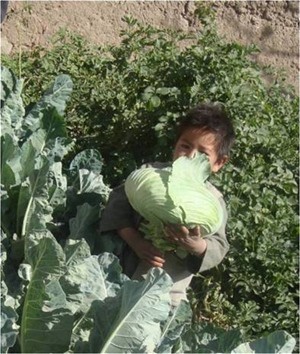
Young boy shows the fruits of the kitchen garden that will provide a variety of nutritious vegetables.
USAID/BASICS
USAID emphasizes nutrient-rich foods that can be grown locally and contribute to a balanced diet for children
16 AUGUST 2011 | BAMYAN, AFGHANISTAN
The carefully irrigated kitchen garden provides welcome splashes of different shades of green against the surrounding dry brown soil and rocks. Shukria, a community health worker in Bamyan Province, takes great pride in the lush vegetables and ripening fruits that have improved her family’s diet.
The gardens that Shukria and other women grow started as a part of a community-based growth monitoring program facilitated by family health action groups. These groups are usually comprised of 10-15 mothers and their children who gather monthly with a community health worker to monitor children’s growth and share health messages and healthy practices. These monthly sessions successfully identify children less than two years of age who are not gaining enough weight or are undernourished, and provide counseling for the mothers. Community health workers use stories and picture books developed with USAID support to show mothers what foods to grow and how to prepare them to provide their children with a balanced diet.
USAID emphasizes nutrient-rich foods that can be grown locally and contribute to a balanced diet for children. In Bamyan, potatoes and wheat are readily available, but carrots, spinach, and other nutrient-rich vegetables are rarely grown. To overcome this problem, a USAID child health project works with the UN Food and Agriculture Organization to provide indigenous vegetable seeds to community health workers to start demonstration kitchen gardens. The community health workers show mothers in the community how to grow a mix of healthy vegetables and grains for their families.
This activity is a critical part of a larger effort to reduce illness and death in children. Under-nutrition in children slows physical and mental development and weakens their immunity—which leaves them more susceptible to infectious diseases such as diarrhea and pneumonia, the main killers of children in Afghanistan. Under-nutrition is the result of insufficient food intake and a lack of diversity in the diet. The community health workers have increased enthusiasm for the growth monitoring program by teaching mothers in the community how to grow and prepare healthier meals that include vegetables.







Comment
Make a general inquiry or suggest an improvement.